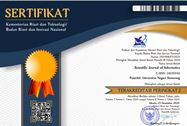Test-Driven Development (TDD) for Point of Sale System at Bicycle Shop
(1) Dian Nuswantoro University
(2) Dian Nuswantoro University
Abstract
Keywords
Full Text:
PDFReferences
R. Kaur and J. Sengupta, (2013). “Software Process Models and Analysis on Failure of Software Development Projects,†Int. J. Sci. Eng. Res., vol. 2, no. 2, pp. 1–4.
S. Kumar and S. Bansal, (2013). “Comparative Study of Test Driven Development with Traditional Techniques,†Int. J. Soft Comput. Eng., vol. 3, no. 1, pp. 352–360.
K. Bajaj, H. Patel, and J. Patel, (2015). “Evolutionary software development using Test Driven approach,†2015 Int. Conf. Work. Comput. Commun. IEMCON 2015.
R. Latorre, (2014). “A successful application of a Test-Driven Development strategy in the industrial environment,†Empir. Softw. Eng., vol. 19, no. 3, pp. 753–773.
I. Karac and B. Turhan, (2018). “What Do We (Really) Know about Test-Driven Development?,†IEEE Softw., vol. 35, no. 4, pp. 81–85.
B. K. Aichernig, F. Lorber, and S. Tiran, (2014). “Formal test-driven development with verified test cases,†Model. 2014 - Proc. 2nd Int. Conf. Model. Eng. Softw. Dev., pp. 626–635.
N. Bouraqadi and D. Mason, (2018). “Test-driven development for generated portable Javascript apps,†Sci. Comput. Program., vol. 161, no. February, pp. 2–17.
F. Besson, P. Moura, F. Kon, and D. Milojicic, (2015). “Bringing Test-Driven Development to web service choreographies,†J. Syst. Softw., vol. 99, pp. 135–154.
N. C. Borle, M. Feghhi, E. Stroulia, R. Greiner, and A. Hindle, (2018). “Analyzing the effects of test driven development in GitHub,†Empir. Softw. Eng., vol. 23, no. 4, pp. 1931–1958.
A. R. Guduvan, H. Waeselynck, V. Wiels, G. Durrieu, Y. Fusero, and M. Schieber, (2014). “STELAE - A model-driven test development environment for avionics systems,†16th IEEE Int. Symp. Object/Component/Service-Oriented Real-Time Distrib. Comput. ISORC 2013, pp. 1–8.
J. W. Burris, (2017). “Test-driven development for parallel applications,†Proc. - 2017 2nd Int. Conf. Inf. Syst. Eng. ICISE 2017, vol. 2017-January, pp. 27–31.
P. Hamill, D. Alexander, and S. Shasharina, (2009). “Web service validation enabling test-driven development of service-oriented applications,†Serv. 2009 - 5th 2009 World Congr. Serv., no. PART 1, pp. 467–470.
N. Laranjeiro and M. Vieira, (2009). “Extending test-driven development for robust web services,†Proc. - 2009 2nd Int. Conf. Dependability, DEPEND 2009, pp. 122–127.
A. Nanthaamornphong and J. C. Carver, (2018). “Test-driven development in HPC science: A case study,†Comput. Sci. Eng., vol. 20, no. 5, pp. 98–113.
R. Hametner, D. Winkler, T. Östreicher, N. Surnic, S. Biffl, and A. T. Vienna, (2010). “Selecting UML Models for Test-Driven Development along the Automation Systems Engineering Process Automation and Control Institute , Vienna University of Technology,†Test, pp. 2–5.
R. K. Lenka, S. Kumar, and S. Mamgain, (2018). “Behavior Driven Development: Tools and Challenges,†2018 Int. Conf. Adv. Comput. Commun. Control Netw., pp. 1032–1037.
C. Fontela and A. Garrido, (2013). “Connection between safe refactorings and acceptance test driven development,†IEEE Lat. Am. Trans., vol. 11, no. 5, pp. 1238–1244,.
W. Shelton, N. Li, P. Ammann, and J. Offutt, (2012). “Adding criteria-based tests to test driven development,†Proc. - IEEE 5th Int. Conf. Softw. Testing, Verif. Validation, ICST 2012, pp. 878–886.
D. Fucci, H. Erdogmus, B. Turhan, M. Oivo, and N. Juristo, (2017). “A Dissection of the Test-Driven Development Process: Does It Really Matter to Test-First or to Test-Last?,†IEEE Trans. Softw. Eng., vol. 43, no. 7, pp. 597–614.
M. PanÄur and M. CiglariÄ, (2011). “Impact of test-driven development on productivity, code, and tests: A controlled experiment,†Inf. Softw. Technol., vol. 53, no. 6, pp. 557–573.
W. Bissi, A. G. Serra Seca Neto, and M. C. F. P. Emer, (2016). “The effects of test driven development on internal quality, external quality and productivity: A systematic review,†Inf. Softw. Technol., vol. 74, pp. 45–54.
E. R. Subhiyakto and D. W. Utomo, (2017). “RMTool ; Sebuah Aplikasi Pemodelan Persyaratan Perangkat Lunak menggunakan UML,†JNTETI, vol. 6, no. 3, pp. 268–274.
A. Čaušević, S. Punnekkat, and D. Sundmark, (2012). “Quality of testing in test driven development,†Proc. - 2012 8th Int. Conf. Qual. Inf. Commun. Technol. QUATIC 2012, no. i, pp. 266–271.
E. R. Subhiyakto and D. W. Utomo, (2016). “Software Testing Techniques and Strategies Use in Novice Software Teams,†J. Sist. Inf.
Refbacks
- There are currently no refbacks.
Scientific Journal of Informatics (SJI)
p-ISSN 2407-7658 | e-ISSN 2460-0040
Published By Department of Computer Science Universitas Negeri Semarang
Website: https://journal.unnes.ac.id/nju/index.php/sji
Email: [email protected]
This work is licensed under a Creative Commons Attribution 4.0 International License.



